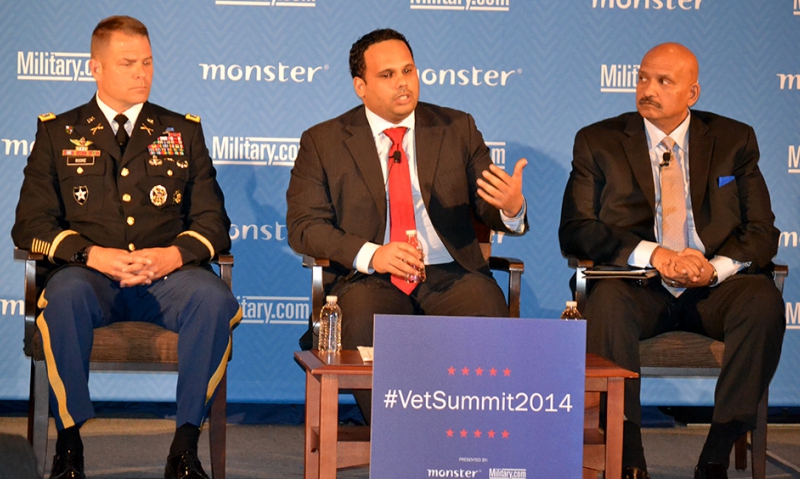
American Legion attends National Veteran Employment Summit in Washington, D.C., where Medal of Honor recipient Sal Giunta was keynote speaker.
Jobs for veterans – and how to help them get those jobs – was a major theme at the National Veteran Employment Summit on April 30 at the Renaissance Mayflower Hotel in Washington. The one-day event, sponsored by Monster Worldwide and Military.com, brought together veterans, military spouses, members of Congress and business experts from the private and government sectors.
Steve Gonzalez, The American Legion's assistant director for veterans employment and education, spoke to attendees, as well as keynote speaker and Medal of Honor recipient Sal Giunta.
Giunta, an honorary lifetime member of American Legion Post 735 in Hiawatha, Iowa, shared how he joined the U.S. Army and became a member of the 173rd Airborne Infantry, "2,000 hardened warfighters" who reminded him often "that all great things take lots of preparation."
The sharpest memories from his first firefight in Afghanistan are not of him being shot at, "but watching the bullets chase after my buddies." Experiencing combat with his unit made him see "the hearts of the people around me and how resilient they were."
On Oct. 25, 2007, Giunta's scout team in Afghanistan walked right into an enemy ambush. "Almost every person was shot within five secords." he said. But because the men had been trained for this moment, "we knew what to do – close with and destroy the enemies of the United States of America." He killed at least one enemy insurgent that day and rescued a severely wounded member of his unit, who later died. For his actions on that day, Giunta received the Medal of Honor.
Asked by an audience member about his thoughts on hiring veterans in the private sector, Giunta said, "I think the veterans will speak for themselves. Find the right people and do it for the right reason." Then give America's veterans "the opportunity to exceed expectations."
Giunta's advice was echoed and amplified by panelists who discussed several key issues: employment perspectives from veterans and their spouses, dispelling myths about hiring veterans with post-traumatic stress disorder, how companies can effectively hire and retain veterans, bridging the gap between military and civilian employment, and how communities can support veteran employment.
During his discussion, Gonzalez focused on how veterans can bridge the gap between their military training and experience to get a steady, rewarding job in the civilian workforce. While many servicemembers leave active duty with skills that can transfer immediately into the private sector, many veterans need some level of training or certification to make them "ideal" candidates.
"How do we bridge those gaps?" Gonzalez asked attendees, noting that money from taxpayers is used to train America's military. He pointed to registered apprenticeships and more partnerships with local schools and businesses as strategies that help veterans in their job transition. The private sector has taken a good look at the way the military trains its troops; some training is more adaptable to the private sector later on. "How can they compromise? What is matching and what is not? How can we get (the military and private sector) closer so that veterans won't have to retrain as much?"
Noting that the World War II-era GI Bill (written by The American Legion) created America's middle class, Gonzalez said the current generation of Iraq and Afghanistan veterans are another "viable workforce for the U.S. economy."
Gonzalez emphasized that job-seeking veterans should take some time in choosing employment tools that work best for them. While an online job skills translator, such as the one developed by Military.com, may be useful to many, others may get more benefit from attending career fairs, such as those co-sponsored by The American Legion and the U.S. Chamber of Commerce.
Each veteran should examine his or her own job environment, Gonzalez said. "That will determine the best system for you to be successful."
- Careers

